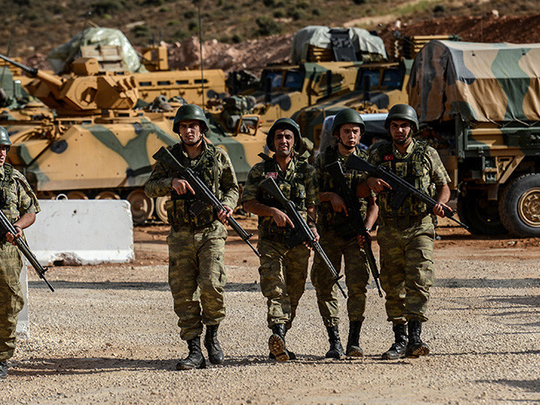
During United States Secretary of State Rex Tillerson’s weekend visit to Ankara, an agreement was apparently reached, ending months of Turkish-US discord over the long-term future of Kurdish ambitions in Syria. It was decided that the controversial Afrin Operation would stop, and that control of the much-contested city would go neither to the Turks nor to the Kurds, but rather, to Syrian government troops and their Russian backers. Given Afrin’s location within Russia’s sphere of influence in Syria, west of the Euphrates River, it seemed only logical to let the Russians handle it; provided they would never let the Kurds annex it to their territorial ambitions.
This is what Russian President Vladimir Putin had promised Turkey when Russian troops entered Afrin in mid-2017, raising their flags on armoured vehicles while parading through the city, clearly to be seen by all parties concerned. President Recep Tayyip Erdogan did not mind, desperate for a way out of the Afrin Operation, which has been a disaster for Turkey. Turkish forces have been unable to march on the city, let alone penetrate Kurdish defences. It was supposed to be swift, yet nearly one month down the road, 28 fighters have been killed on the Turkish side, and Afrin remains firmly in the hands of the Kurds. The Kurds put up a brave resistance, seeing Afrin as a matter of life and death. Bombing them from afar will simply not force them out of the city — they will just retreat into the caves, mountains, and tunnels of Afrin, in rugged territory that they know inside out, but which the advancing Turkish forces are totally unfamiliar with.
Additionally, the Afrin battle has tarnished Erdogan’s already troubled reputation — his forces have been accused of using napalm, a flammable liquid prohibited in combat (denied by Turkey. The US says it is unlikely Turkey used chemical weapons). One video made the rounds on social media networks, raising outcry from human rights groups around the world, showing Turkish-backed troops stomping the corpse of a Kurdish female fighter after chopping off her breasts. More than 600 journalists, bloggers, and human rights activists have been arrested in Turkey, accusing Erdogan of war crimes. Far from being deterred, the Kurds have even been striking back deep into Turkish territory, destroying a 17th century mosque dating back to Ottoman times. If allowed to continue, the Afrin operation would probably cost the Turks plenty of money and manpower — with no secured victory in sight.
So long as Afrin was prevented from linking three Kurdish cantons together, serving as cornerstone for the blueprint Kurdish federal government in northern Syria, Erdogan was willing to hand it back to Damascus and Moscow. Kurdish parties had hoped to include Afrin in a federal government they were planning to set up in northern Syria, holding elections there last September. The Kurds of course are unhappy with the deal, but they are in no position to say no to the Americans, given that their militias are the only force in the Syrian battlefield, still receiving US arms and money.
Syrian government troops will reportedly enter Afrin by the end of this week, and in exchange, Erdogan will get to deploy his forces, side-by-side with the Americans, in the town of Manbij, 30km west of the Euphrates. Erdogan had long wanted to march on Manbij, originally aiming to include it in the Turkish buffer zone carved out along the border in the summer of 2016. It was supposed to join the towns of Jarablus, Al Bab, and Azaz, which Turkish forces had entered to keep Kurdish militias, and Daesh (the self-proclaimed Islamic State of Iraq and the Levant), away from the Syrian-Turkish borders. To his dismay, Manbij was liberated from Daesh not by Turkey but Kurdish forces, who have been ruling the city for nearly two years now. According to the latest Tillerson deal, they will now leave Manbij, heading to US-held Kurdish districts east of the Euphrates River.
In the past, US President Donald Trump had repeatedly refused to discuss such territorial swaps with Erdogan, especially at the expense of his Kurdish allies. He regarded them as vital in the war on terror — friends that ought to be embraced and rewarded for their battlefield feats in combating Daesh. Despite non-stop pressure from the Turks, he has repeatedly refused to stop funding Kurdish militias or to break with the People’s Protection Units (YPG), who are accused by the Turkish Government of being “terrorists” affiliated with the outlawed PKK. Adding insult to injury, the 2019 Pentagon budget, publicised on February 12, allocates $550 million (Dh2.02 billion) for the Syrian Democratic Forces (SDF), sending shivers down the spine of the Turkish president. Clearly, the Americans are unwilling to break with the Kurds of Syria, but they are open to restricting their expansion to territories east of the Euphrates River only, letting the Russians handle everything west of it. This means that the end result are Kurdish pockets east of the Euphrates, but no Syrian Kurdistan stretching along the Syrian north, west and east of the Euphrates.
Sami Moubayed is a Syrian historian and former Carnegie scholar. He is also the author of Under the Black Flag: At the frontier of the New Jihad.








